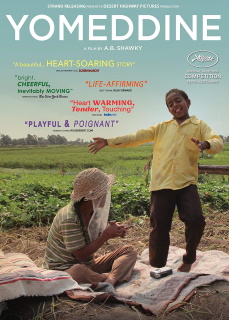

|
|
Yomeddine
R1 - America - Strand Releasing Review written by and copyright: Eric Cotenas (8th November 2019). |
|
The Film
 François Chalais Award: A.B. Shawky (nominated), Golden Camera: A.B. Shawky (nominated), and Palme d'Or: A.B. Shawky (nominated) - Cannes Film Festival, 2018 Left outside the gates of a leper colony outside Cairo thirty years ago back when the only way to treat the disease was complete quarantine, forty-year-old Beshay (Rady Gamal) knows little of life outside apart from his job scavenging goods to sell from Garbage Hill with his orphan apprentice Obama (Ahmed Abdelhafiz). He had found some happiness when he married Ireny until she had to be hospitalized permanently. After Ireny dies, Beshay is surprised when her mother comes to visit. The visit from a woman who he has never met brings back his memory of his own father promising to visit but never coming. Upon learning that his mother-in-law learned of Ireny's death from the colony's administration, he demands to see his own file for contact information for his family only to learn that there is none since he was abandoned and never registered. Other members of the colony have come to accept that their family have forgotten about them or would like to pretend they do not exist, so Beshay decides to take off atop his donkey Harby on his own to find the village of his birth Abduhoor in Qena. Instructed to follow alongside the Nile to find Qena, it is not until Beshay arrives at the pyramids that he discovers a stowaway in Obama who has no reason to stay behind without him; so Beshay thinks that the least he can do is get Obama as far as Silhog and the orphanage at which Obama recalls being happier before he was transferred. Along the way, Beshay encounters people who still fear contagion, refusing to give lifts and kicking them off the train, and Beshay even lands in jail for lewd conduct when he arrives at a clinic in his underwear after Obama is knocked unconscious in an accident with their cart. They also discover along the way assistance and even compassion fellow outcasts: from Ahmadi Muslims to a colony of beggars who at first see them as competition. As Beshay and Obama get closer to their destination, Beshay begins to fear the possibility of rejection from his family and considers turning back ("At least we got to see the world"). The debut feature of NYU-educated A.B. Shawky, Yomeddine – the official submission for Egypt to the Best Foreign Language Film category of the 2019 Academy Awards – sprung from the documentary El Mosta'mara Shawky shot a decade before, and the feature's original screenplay was his thesis project. While the film follows familiar dramatic beats of a road movie and the question of whether families are where you came from or the close connections you find in life, the film feels fresh because it sheds light on a forgotten or shunned population for whom such questions have been little explored, and because of the presences of Gamal – although he is a non-professional actor, his cry of "I'm a human being" to angry and terrified train passengers is a powerful moment rescued from a cliché – child actor Abdelhafiz, and Shawky's cinematographic handling of them in contrast to the coverage of the supporting performers (many of whom may or may not be professional actors but give more conventional performances). Although things happen pretty much as the viewer expects, outside of the usual twists and turns of the road movie, Yomeddine turns out to be an immensely moving film thanks to Shawky's deft handling of the simple story and recognition of its complex emotions.
Video
Lensed in HD, Yomeddine's reliance on natural light for both the day and night exteriors and the interiors means that close-ups fare best in this high bitrate, progressive, anamorphic 1.78:1 transfer from facial features to the textures of the environments (from sandblasted pyramids and austere mosques to garbage heaps and derelict buildings).
Audio
The sole audio option is an Arabic Dolby Digital 5.1 track that is very front-oriented from dialogue to sparse directional effects while the surrounds are used conservatively for a hint of atmosphere and some of the scoring.
Extras
Extras include an interview with director A.B. Shawky and producer Dina Emam (20:38) who discuss the earlier leper colony documentary, their separate NYU educations , meeting in Egypt (Emam is a New Yorker whose family is of Egyptian origin) at a film festival, and the various incarnations of the script which was initially written with a member of the colony in mind who died in the ten years it took to get funding (his wife was also considered to take his place but she grew too ill over the period), and the discovery of Gamal. They also discuss the casting of child actor Abdelhafiz who lived along with them along with his mother during four months of pre-production. Shawky also describe his methods of letting the camera capture the two performers while Emam discusses how the film has transformed Gamal's self-confidence as his newfound celebrity has also made people less reticent about approaching him. The film's theatrical trailer (1:44) is also included along with four trailers for other films.
Overall
Although things happen pretty much as the viewer expects, outside of the usual twists and turns of the road movie, Yomeddine turns out to be an immensely moving film thanks to director A.B. Shawky's deft handling of the simple story and recognition of its complex emotions.
|
|||||

|